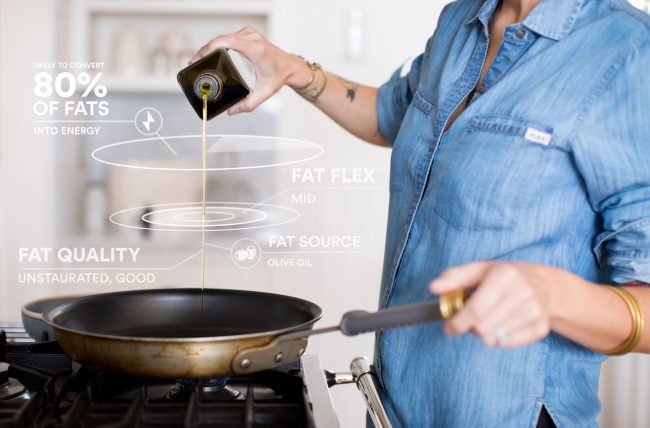
In some countries the preparation of diets is a billion — dollar industry, in terms of money. Over the last few years there have been invented a lot of diets devoted to increasing protein, reducing fat and lowering the calories in the food. Special attention to the diet given to the athletes. It is known that people strive to keep fit and do nothing. But that didn’t work. The new California company is working to eliminate the root causes of why our diet works: no one diet does not take into account unique genetic code. The program “personalized nutrition” from Habit attempts to analyze human DNA and create a customized nutrition plan and delivery of the ingredients into a person’s home. The company officially started to work a few days ago, and their services will be available in early 2017.
The main objective of any diet plan on losing weight, is reducing calories. But more and more studies show that the reason for the failure of the diet often is that the same food may be completely different effects on different people — the same dish can give more calories to one and less to others, and jump in the sugar levels vary from person to person. For these reasons, it is difficult to make a diet that will work for everyone. And that’s why many scientists are turning to the idea of personalized nutrition or nutrigenomics to analyze DNA to find out what food makes us healthier.
“We always rowed one size fits all, making a diet and most dieters have tried and failed,” says Alan Greene, a pediatrician and medical Advisor to Habit. He says that you first need to understand the complexity of our biology, and then to determine the plan that will lead to success in the industry in which usually all pleshut.
Habit plans to use genetic markers to identify your ideal food and send the food directly to your home. Of course, at first it will be in the US, but someday, perhaps, there will have. Clients get set for blood sampling. Self pricking her finger, they send blood samples to the laboratory where microbiologists identificeret a number of biomarkers, seeking genetic variations in DNA that affect the digestion and absorption of food.
Customers also get a drink called “metabolic challenge”. He is a typical American diet: a cocktail of fats, sugars and carbohydrates, which “defy the system”. After a drink, users donate blood again, to find out how well their body can withstand the effects of fats and sugar. Finally, the clients provide a number of body metrics: height, weight, waist circumference, misleading about your lifestyle, tell you how often I run or exercise. All this leads to the preparation of a personalized nutrition plan, appropriate to each separately.
When Habit will release the first kits for home testing in January, it will be the first full programme of the supply from laboratory to client. It will assess not calories, type of food or its quantity, and personal genetic response to food, provide customers with delivery of food, further tests and dieticians. Some may be lucky and their bodies, for example, are best to metabolize carbohydrates; others will be encouraged to focus on protein, sacrificing the carbohydrates and fats. Third, it may be recommended to absorb food more than the average because of accelerated metabolism. Biomarkers can also tell you about other more personalized things, such as how you metabolize caffeine.
Science sort of supports this idea. In the study of the journal Cell from 2015, the researchers gave 800 people the same food and then measured their glucose levels. It turned out that, despite the identity of food, the level of glucose in the blood increased differently. This applies not only rich in sugar food like ice cream, but food with a low glycemic index, like whole wheat bread. The study also showed that the personal plan on the basis of genetics helps to reduce the level of postprandial glucose in General.
Other research has shown similar results, and currently the idea of personalized nutrition is given much attention. However to conduct this type of test is very expensive and it would change the Director of Habit by Neil Grimmer. He personally costly DNA testing and the selection of food helped to lose more than 10 pounds and return his body back to the triathlon. His goal was to make such a service available to all. Currently Habit takes $ 299 for initial testing, recommendations on diet and session conversations with a nutritionist. Food and subsequent testing are not included in the initial cost.
Nevertheless Habit just started work and just trying to uncover all the factors that affect how we digest and assimilate food. Therefore, the Academy of nutrition and dietetics does not recommend the use nutrigenetics testing as a basis for drawing up the diet. Elementary, they have not been enough number of studies and have not proven effective. Yet.
Studies also show that the intestinal microbiome can have a significant impact on how we split the food, and the nutrients and calories that we extracted from it. Further, depending on what a person eats, the intestinal microbiome may change, and therefore will change and some proper man food. Habit does not take into account or analyze the microbiome. However, in the future, and will include these studies in the process of their work.
Currently, only the study of personalized nutrition and nutrigenomic make the idea a promising Habit. It is unclear whether clients enjoy the meals they will offer their own genome. But green notes that the idea of using food and diet as a treatment for long neglected by Western medicine, and it’s time to change that. Perhaps Habit with her caring approach will be able to fulfill the Testament of Hippocrates: “Let food be thy medicine and medicine be your food.”
Is it possible to bring the perfect diet based on DNA?
Ilya Hel
